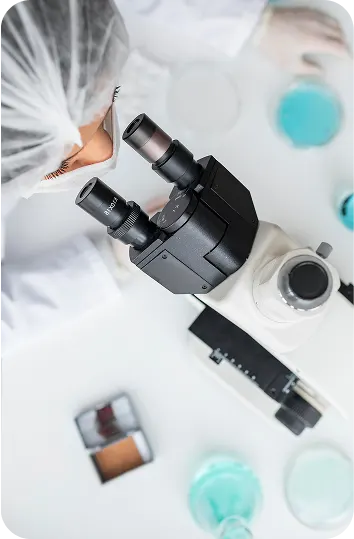Fertility Preservation
Freeze your eggs or sperm and decide when to become a mom or dad
Are you thinking about having children later on, or facing a medical treatment that could affect your fertility?
Preserving your fertility today may be the best decision for your future.

What is fertility preservation?
Fertility preservation is a procedure that allows eggs, sperm, embryos, or even ovarian tissue to be frozen and stored in a specialized bank for future use. It’s a solution for those who want to postpone parenthood for personal, academic, professional, or medical reasons.
It is also highly recommended for patients about to undergo treatments such as chemotherapy, radiotherapy, or surgeries that could impact their reproductive capacity.
How does the procedure work?

Preparation
For women, the process starts with lab tests and an ultrasound to assess ovarian reserve and individualized the best strategy.

Ovarian stimulation
Over 10–14 days, hormonal medications favor several follicles that grow in the ovaries. The specialist monitors progress through ultrasounds until the follicles reach the right size. For cancer patients needing urgent oncology treatment, ovarian stimulation can be done with special fast-start protocols.

Egg retrieval (follicular aspiration)
About 36 hours after the final hormonal trigger (similar to in vitro fertilization patients), a minimally invasive painless procedure is performed under sedation to retrieve the eggs. Using a fine needle guided by transvaginal ultrasound, mature eggs are collected.

Freezing
In the lab, mature eggs are frozen at very low temperatures using a technique called vitrification, then stored safely in Reprotec’s gamete bank.

For men
One or more semen samples are obtained either through ejaculation or specialized surgical methods, prepared in the andrology lab, and frozen at very low temperatures.
With this technique you will be able to maintain control of your autonomy to decide to have children with your own gametes, choosing the best moment of your life to do it.
Who usually chooses to freeze eggs or sperm?

Women who want to delay motherhood without being limited by the “biological clock.”

Patients undergoing medical treatments or surgeries that could affect reproductive organs.

Couples who want to plan the right moment to become parents with peace of mind.

Individuals from the LGBTIQ community.
Preguntas frecuentes sobre la preservación de la fertilidad
- ¿Cómo sé la calidad de mis óvulos?
- ¿Qué pasa el día de la aspiración folicular?
- ¿Es seguro congelar óvulos? ¿Existen riesgos?
- ¿Qué sucede con mis óvulos si no los utilizo?
- ¿Debo tomar suplementos antes o durante el proceso?
- ¿Cómo afecta el SOP (Síndrome de Ovario Poliquístico) la preservación?
- ¿Es mejor congelar óvulos o embriones?
- ¿Existe un límite de edad para congelar óvulos?
- ¿El uso de anticonceptivos afecta mi AMH?
- ¿Hay un peso límite para la preservación?
- ¿Qué medicamentos y hormonas se utilizan en el procedimiento?
- ¿Qué debo hacer para preparar mi cuerpo antes de congelar óvulos?
- ¿Qué debo saber sobre la congelación de espermatozoides?
- ¿Cuánto tiempo pueden permanecer congelados los óvulos?

